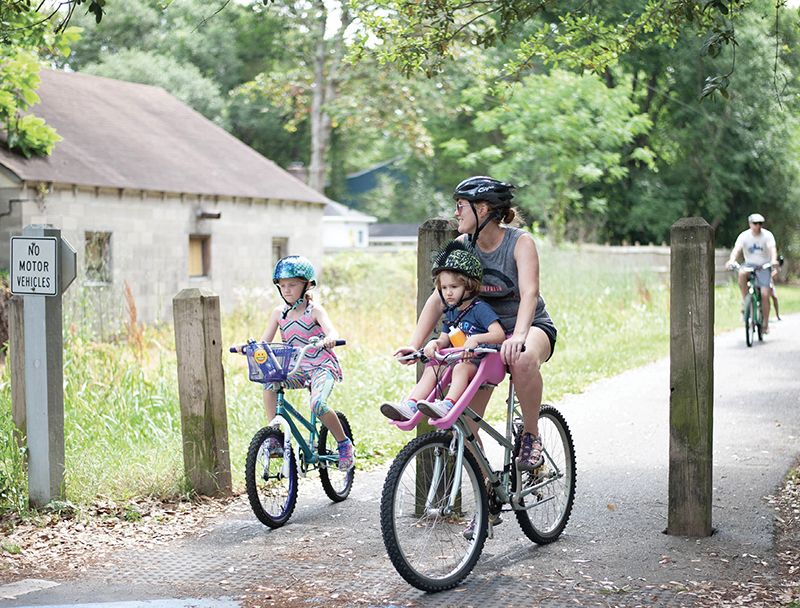Exploring a pandemic silver lining: fewer cars on the roads gave more opportunity to safely walk and bike through the city

“Southerners love their cars.” I’ve heard that line time and again in my role as the executive director of Charleston Moves as I advocate for safe spaces for people to walk, navigate their wheelchairs, take public transit, or bike. But thanks to what the pandemic has revealed, I discovered what people actually love is freedom, and I’m glad to see others beginning to reconsider what that means for how we get around.
For all of the terrifying aspects of COVID-19 and the shutdown, a silver lining is that we have been getting outside and shifting how we move. Last year, with streets suddenly quiet, Charlestonians began dragging dusty bikes out from sheds and garages and taking them to local bike shops for repair. Others who didn’t have wheels bought up every available bicycle in the region (and country, actually). Bicycle shops continue to be inundated!
As advocates, we acted quickly to ensure bicycle shops were considered “essential businesses” and allowed to stay open. Clearly, citizens agreed, making it the easiest “ask” that my colleague, Savannah Brennan, and I have made of local and state officials. They, too, recognized the urgency of bicycle access as a both a much-needed stress reducer and a socially distanced transportation option.
The beauty was that the more we began biking and walking around town, the more we remembered the exhilarating independence and fun of being outside, moving at a slower pace, with the breeze and sun in our faces. With a 75 percent reduction of cars on our roads according to Charleston Police Chief Luther Reynolds, we saw an organic rebalancing of pavement use. People took to the streets—actually, they took over the streets, because the odds of a downtown sidewalk providing six feet to socially distance between passersby are slim to none.
Paths everywhere became crowded as people clamored to get outside. Wonders’ Way on the Ravenel Bridge and the West Ashley Greenway, already heavily used, morphed into little superhighways for humans of all ages, ethnicities, and socioeconomic backgrounds.
One morning during the first few weeks of the shutdown, I hopped on my trusty sticker-covered road bike, Fernando, to head from West Ashley to my office downtown. I passed Hampton Park, and stopped short when I saw Mary Murray Boulevard absolutely packed with people, including the teeniest children, on bikes and scooters. They were adorable and happy, and their parents were having a great time, too. With less traffic to worry about, they could relax and have fun. I pedaled alongside them with the craziest smile on my face, waving to strangers. Outside the park, there were just as many adults and children walking and biking, strolling and scooting in the surrounding neighborhood. I didn’t have to visualize what the Lowcountry could be like if we prioritized safe streets. Here was the reality and joy of it, clear as day.
As businesses began to reopen, they, too, recognized the economic value of streets that are welcoming to people. Business owners and residents began to ask for pedestrian-only blocks, setting up bike lanes, and converting on-street parking spaces into outdoor dining. A block of South Market Street became a pedestrian plaza from 9 a.m. to 5 p.m., with a temporary bike/ped lane 24/7. Babas on Cannon and D’Allesandro’s Pizza created on-street dining parklets. Mary Murray Boulevard was designated car-free for longer hours.
I believe the opportunity to transform Charleston into a connected, safe, accessible, and equitable community is stronger than ever. It’s hard to ignore the number and diversity of people who took to streets they normally would have only traversed in a car. And now those folks also recognize the value of parks, greenways, safe bike lanes, and multiuse paths, and they are joining us as advocates for “complete streets,” i.e. those that are safe and accessible for all users.
So, do Charlestonians love their cars? Well, sure, cars are good and necessary, but the coronavirus made it clear that we also love getting outside and moving around in ways that are fun and freeing. Renewed life in and on our streets has been one happy, and actually healthy, result of COVID-19 (though we’d prefer to see residents and visitors out enjoying safe streets and pathways without suffering through a pandemic). In fact, we at Charleston Moves have been working toward that vision, long before COVID-19. And after the virus is long gone, we’ll still be advocating for safe places to walk, ride, and move around, so this renewed life on our streets will be ongoing. We welcome you to join our efforts.